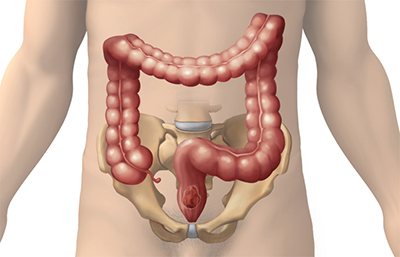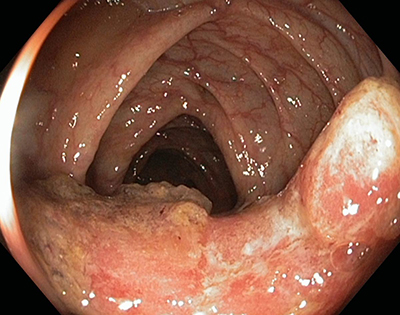 Colon cancer is the second highest occurring cancer among men in Malaysia. Colon cancer, if treated at the early stages, can improve mortality rate up to 5 years in 90% of first stage patients. In fact, colon cancer patients still have the chance of recovery at the fourth stage by undergoing recommended treatment. Generally, colon cancer is a cancer that attacks the large intestines (colon, rectum, and anus).
Colon cancer is the second highest occurring cancer among men in Malaysia. Colon cancer, if treated at the early stages, can improve mortality rate up to 5 years in 90% of first stage patients. In fact, colon cancer patients still have the chance of recovery at the fourth stage by undergoing recommended treatment. Generally, colon cancer is a cancer that attacks the large intestines (colon, rectum, and anus).
What is the colon?
The colon begins on the right side, from the ‘caecum’ and ends at the rectum. The function of the colon is to absorb water so that formed faeces are not watery. Human can survive without the colon. However, human cannot live without the small intestine because its function is to absorb water, vitamins, and minerals. The function of the colon can be taken over by the small intestines in the event of a removal.
What are the symptoms of colon cancer?
Among the signs of colon cancers are:
- Faeces with blood – Blood mixed with faeces, sometimes appears black like coffee. These are some of the earlier signs of colon cancer.
- Changes in bowel movement patterns such as constipation. Each individual would have different bowel movements. If the frequency of defecation extends for too long, for example from daily defecation reducing to every 3-4 days, this may be a symptom.
- Diarrhoea – This is a sign of colon cancer on the left part.
- Constipation alternated with diarrhoea – Colon cancer that is almost blocking the intestine will cause difficulty in bowel movement. Patient will experience constipation at this point. Stuck faeces contain a lot of bacteria and will “rot” in the intestines, causing water to be reabsorbed and turning the faecal product watery and soft. The patient will then experience diarrhoea. The frequency of the diarrhoea will be more than 5 times to the extend some patients will complain of being unable to control it. The cycle of constipation and diarrhoea will be repeating.
- No bowel movement or farting and vomiting. This will happen when the intestines are completely blocked.
- Loss of appetite and weight loss. Patients will become thin and appetite loss happens within a short period of time.
- Stomach ache – A symptom that is often overlooked. Pain in the abdomen depends on the location of the colon cancer.
- Habit of going to the toilet, but no defecation – Patient feels the urge to poop but no defecation happens. This is due to the cancer occurring in the rectum area. When the growth has filled the rectum, it gives the wrong message to the body as if the rectum is loaded with faeces. In this case there is no faecal matter but it is full of cancer cells.
How is colon cancer tested?
In Malaysia, the Ministry of Health provides a colon cancer testing service at Health Clinics. The tests run are FOBT (Faecal Occult Blood Test). This test requires patients to provide a faecal sample to be tested for presence of blood (microscopically). If the test proves positive, then a further check that is endoscopy will be done to determine the cause of microscopic blood. Among the cause for FOBT to be positive are:
- Intestinal polyps – Overgrowths that can be the cause of colon cancer or caused by inflammation.
- Angiodysplasia – Abnormal blood vessels in the intestines that can bleed.
- Diverticulum – Pockets in the intestines due to weak muscles (age factor, constipation)
- Stomach ulcer – This can cause presence of microscopic blood.
 Only through colonoscopy tests can colon cancer be confirmed. Colonoscopy is a procedure where a plastic tube with a camera end is inserted through the anus of the patient to look into the colon. This procedure allows the colon to be seen visually and enables biopsies in case of any cysts found.
Only through colonoscopy tests can colon cancer be confirmed. Colonoscopy is a procedure where a plastic tube with a camera end is inserted through the anus of the patient to look into the colon. This procedure allows the colon to be seen visually and enables biopsies in case of any cysts found.
If biopsies show the presence of cancer cells, patient will require further tests such an x-ray, ultrasound, CT scan or MRI to find out the stage of cancer and ensure it has not spread to other organs such as the liver, bladder, and lungs.
Definitive treatment for colon cancer is surgery. The affected colon area is usually removed and the remaining parts of the intestines will be reconnected or brought out to the stomach muscle and skin as a faecal pouch (stoma). However, not all colon cancer cases require a lifetime stoma. Only colon cancer located at the base of the rectum that is near the valve (muscle) that controls fart and defecation requires a lifetime stoma. Most of the stoma installed for colon cancer treatment surgery is temporary; however this depends on the cancer stage and the patient’s health levels.
With newer surgical technology, colon cancer treatment surgeries can be performed laparoscopically or via key-hole surgery. The cut is smaller and the recovery process is much faster.
Apart from surgical treatments, some colon cancer cases may require follow up such as chemotherapy and radiotherapy. This depends on the level of cancer when it is detected and the health condition of the patient.
Dr. Ruhi Fadzlyana is a surgeon based at a hospital in Kuala Lumpur and a lecturer at a local university. This article is translated from the original Malay version at https://www.mmgazette.com/memahami-barah-usus-dr-ruhi-fadzlyana/ by Nur Nadhirah.
[This article belongs to The Malaysian Medical Gazette. Any republication (online or offline) without written permission from The Malaysian Medical Gazette is prohibited.]
